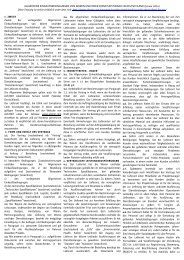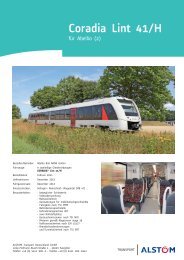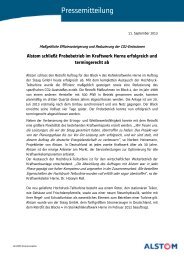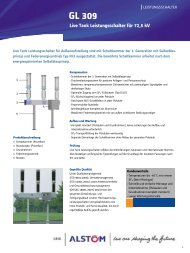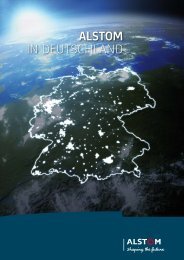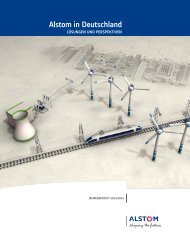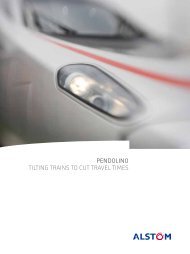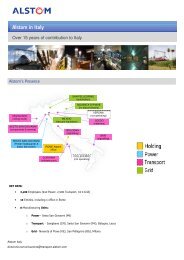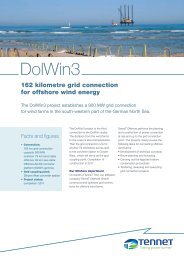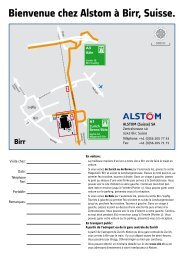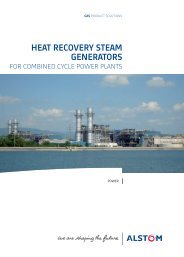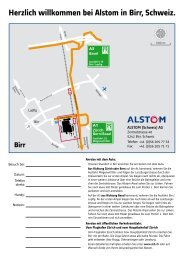MOROCCO IS ACCELERATING! feature - Alstom
MOROCCO IS ACCELERATING! feature - Alstom
MOROCCO IS ACCELERATING! feature - Alstom
You also want an ePaper? Increase the reach of your titles
YUMPU automatically turns print PDFs into web optimized ePapers that Google loves.
PARADOX<br />
Maurice Allais,<br />
Economist, Nobel Prize 1988.THE ALLA<strong>IS</strong><br />
Biography<br />
Maurice Allais had accepted to participate in this issue of AT Magazine.<br />
Very sadly, he died on 9 October 2010 while this project remained unfi nished.<br />
We are nevertheless offering you the opportunity to read the few lines<br />
that he had begun to prepare. It had been agreed that he would evoke for<br />
us the famous allegory of the Calais Passenger, known as the Allais Paradox.<br />
We invite you to discover this innovative idea on pricing at marginal cost<br />
compared with pricing at average cost. The application of these ideas<br />
to the transport or energy sectors mobilised in the post war period a group of<br />
economists and industrialists which included Maurice Allais, Marcel Boiteux,<br />
the future President of EDF, and Gabriel Dessus, Sales Director at EDF.<br />
French economist, born in Paris<br />
on 31 May 1911, died<br />
in Saint-Cloud on 9 October 2010.<br />
Engineer service des Mines<br />
de Nantes from 1937 to 1943.<br />
Director Bureau du documentation<br />
et de statistique minière from 1943<br />
to 1948.<br />
Director of Research<br />
CNRS from 1946 until his<br />
retirement in 1980.<br />
In 1944, he was appointed<br />
Professor of Economics<br />
at the École nationale<br />
des Mines de Paris, a position<br />
which he occupied until 1988.<br />
Director Centre d’analyse<br />
économique from 1946.<br />
Director Economic and Social<br />
Research Group (1944-1970).<br />
Professor of Economic Theory<br />
at the Institut de statistiques<br />
de l’Université de Paris<br />
(1947-1968).<br />
1958-1959: Distinguished<br />
Visiting Scholar at<br />
the Thomas Jefferson Centre<br />
at the University of Virginia.<br />
Professor at the Institut<br />
des hautes études<br />
internationales de Genève<br />
(1967-1970). From 1970 until<br />
1985, he ran the Monetary<br />
Analysis Seminar at<br />
the Université de Paris-X.<br />
Maurice Allais retired in 1980<br />
with the title of Ingénieur<br />
général honoraire au<br />
Corps national des Mines.<br />
“I believe I know quite a lot about transport<br />
as I was responsible, in 1936, at the age<br />
of 25, for checking the accounts of<br />
establishments fi nanced by the State.<br />
I was an engineer working in the service<br />
ordinaire des Mines in Nantes, and<br />
my task in particular included controlling<br />
the accounts of the Compagnie<br />
des chemins de fer de l’Ouest* and those<br />
and formulating proposals. Theory shows<br />
us that for a given distribution of income,<br />
optimum management of the economy,<br />
that is to say maximisation of the social<br />
yield, is attained when each product<br />
or service is sold at its marginal cost,<br />
in other words at a price equal to what<br />
its production actually costs.”<br />
One of the simplest and most accessible<br />
of tramways. After the war, I continued expressions of this work is the Allais<br />
working on this subject Paradox or the Paradox of the Calais �<br />
* The SNCF was not created until January 1938, through the merger of several rail companies, severely weakened by the effects<br />
of the economic crisis of 1929 and by the growing competition from road transport. The Chemins de fer de l’Ouest had been bought<br />
by the State as early as 1909, because of their loss-making situation.<br />
69



